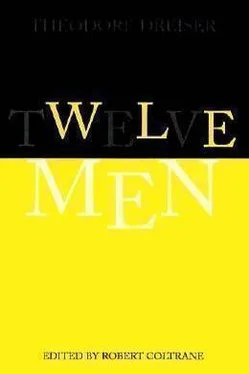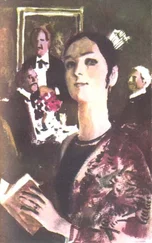Теодор Драйзер - Twelve Men
Здесь есть возможность читать онлайн «Теодор Драйзер - Twelve Men» весь текст электронной книги совершенно бесплатно (целиком полную версию без сокращений). В некоторых случаях можно слушать аудио, скачать через торрент в формате fb2 и присутствует краткое содержание. Год выпуска: 2014, Издательство: epubBooks Classics, Жанр: Биографии и Мемуары, на английском языке. Описание произведения, (предисловие) а так же отзывы посетителей доступны на портале библиотеки ЛибКат.
- Название:Twelve Men
- Автор:
- Издательство:epubBooks Classics
- Жанр:
- Год:2014
- ISBN:нет данных
- Рейтинг книги:4 / 5. Голосов: 1
-
Избранное:Добавить в избранное
- Отзывы:
-
Ваша оценка:
- 80
- 1
- 2
- 3
- 4
- 5
Twelve Men: краткое содержание, описание и аннотация
Предлагаем к чтению аннотацию, описание, краткое содержание или предисловие (зависит от того, что написал сам автор книги «Twelve Men»). Если вы не нашли необходимую информацию о книге — напишите в комментариях, мы постараемся отыскать её.
Twelve Men — читать онлайн бесплатно полную книгу (весь текст) целиком
Ниже представлен текст книги, разбитый по страницам. Система сохранения места последней прочитанной страницы, позволяет с удобством читать онлайн бесплатно книгу «Twelve Men», без необходимости каждый раз заново искать на чём Вы остановились. Поставьте закладку, и сможете в любой момент перейти на страницу, на которой закончили чтение.
Интервал:
Закладка:
But on Friday, as I was talking with some one at my desk, a telegram was handed me. It was from Mrs. Peter and read: "Peter died today at two of pneumonia. Please come."
I could scarcely believe it. I did not know that he had even been sick. His little yellow–haired wife! The two children! His future! His interests! I dropped everything and hurried to the nearest station. En route I speculated on the mysteries on which he had so often speculated—death, dissolution, uncertainty, the crude indifference or cruelty of Nature. What would become of Mrs. Peter? His children?
I arrived only to find a home atmosphere destroyed as by a wind that puts out a light. There was Peter, stiff and cold, and in the other rooms his babies, quite unconscious of what had happened, prattling as usual, and Mrs. Peter practically numb and speechless. It had come so suddenly, so out of a clear sky, that she could not realize, could not even tell me at first. The doctor was there—also a friend of his, the nearest barber! Also two or three representatives from his paper, the owner of the bowling alley, the man who had the $40,000 collection of curios. All were stunned, as I was. As his closest friend, I took charge: wired his relatives, went to an undertaker who knew him to arrange for his burial, in Newark or Philadelphia, as his wife should wish, she having no connection with Newark other than Peter.
It was most distressing, the sense of dull despair and unwarranted disaster which hung over the place. It was as though impish and pagan forces, or malign ones outside life, had committed a crime of the ugliest character. On Monday, the day he saw me, he was well. On Tuesday morning he had a slight cold but insisted on running out somewhere without his overcoat, against which his wife protested. Tuesday night he had a fever and took quinine and aspirin and a hot whiskey. Wednesday morning he was worse and a doctor was called, but it was not deemed serious. Wednesday night he was still worse and pneumonia had set in. Thursday he was lower still, and by noon a metal syphon of oxygen was sent for, to relieve the sense of suffocation setting in. Thursday night he was weak and sinking, but expected to come round—and still, so unexpected was the attack, so uncertain the probability of anything fatal, that no word was sent, even to me. Friday morning he was no worse and no better. "If he was no worse by night he might pull through." At noon he was seized with a sudden sinking spell. Oxygen was applied by his wife and a nurse, and the doctor sent for. By one–thirty he was lower still, very low. "His face was blue, his lips ashen," his wife told me. "We put the oxygen tube to his mouth and I said 'Can you speak, Peter?' I was so nervous and frightened. He moved his head a little to indicate 'no.' 'Peter,' I said, 'you mustn't let go! You must fight! Think of me! Think of the babies!' I was a little crazy, I think, with fear. He looked at me very fixedly. He stiffened and gritted his teeth in a great effort. Then suddenly he collapsed and lay still. He was dead."
I could not help thinking of the force and energy—able at the last minute, when he could not speak—to "grit his teeth" and "fight," a minute before his death. What is the human spirit, or mind, that it can fight so, to the very last? I felt as though some one, something, had ruthlessly killed him, committed plain, unpunished murder—nothing more and nothing less.
And there were his cases of curios, his rug, his prints, his dishes, his many, many schemes, his book to come out soon. I gazed and marveled. I looked at his wife and babies, but could say nothing. It spelled, what such things always spell, in the face of all our dreams, crass chance or the willful, brutal indifference of Nature to all that relates to man. If he is to prosper he must do so without her aid.
That same night, sleeping in the room adjoining that in which was the body, a pale candle burning near it, I felt as though Peter were walking to and fro, to and fro, past me and into the room of his wife beyond, thinking and grieving. His imagined wraith seemed horribly depressed and distressed. Once he came over and moved his hand (something) over my face. I felt him walking into the room where were his wife and kiddies, but he could make no one see, hear, understand. I got up and looked at his cadaver a long time, then went to bed again.
The next day and the next and the next were filled with many things. His mother and sister came on from the West as well as the mother and brother of his wife. I had to look after his affairs, adjusting the matter of insurance which he left, his art objects, the burial of his body "in consecrated ground" in Philadelphia, with the consent and aid of the local Catholic parish rector, else no burial. His mother desired it, but he had never been a good Catholic and there was trouble. The local parish assistant refused me, even the rector. Finally I threatened the good father with an appeal to the diocesan bishop on the ground of plain common sense and courtesy to a Catholic family, if not charity to a tortured mother and wife—and obtained consent. All along I felt as if a great crime had been committed by some one, foul murder. I could not get it out of my mind, and it made me angry, not sad.
Two, three, five, seven years later, I visited the little family in Philadelphia. The wife was with her mother and father in a simple little home street in a factory district, secretary and stenographer to an architect. She was little changed—a little stouter, not so carefree, industrious, patient. His boy, the petted F―, could not even recall his father, the girl not at all of course. And in the place were a few of his prints, two or three Chinese dishes, pottered by himself, his loom with the unfinished rug. I remained for dinner and dreamed old dreams, but I was uncomfortable and left early. And Mrs. Peter, accompanying me to the steps, looked after me as though I, alone, was all that was left of the old life.
A Doer of the Word
Noank is a little played–out fishing town on the southeastern coast of Connecticut, lying half–way between New London and Stonington. Once it was a profitable port for mackerel and cod fishing. Today its wharves are deserted of all save a few lobster smacks. There is a shipyard, employing three hundred and fifty men, a yacht–building establishment, with two or three hired hands; a sail–loft, and some dozen or so shops or sheds, where the odds and ends of fishing life are made and sold. Everything is peaceful. The sound of the shipyard axes and hammers can be heard for miles over the quiet waters of the bay. In the sunny lane which follows the line of the shore, and along which a few shops struggle in happy–go–lucky disorder, may be heard the voices and noises of the workers at their work. Water gurgling about the stanchions of the docks, the whistle of some fisherman as he dawdles over his nets, or puts his fish ashore, the whirr of the single high–power sewing machine in the sail–loft, often mingle in a pleasant harmony, and invite the mind to repose and speculation.
I was in a most examining and critical mood that summer, looking into the nature and significance of many things, and was sitting one day in the shed of the maker of sailboats, where a half–dozen characters of the village were gathered, when some turn in the conversation brought up the nature of man. He is queer, he is restless; life is not so very much when you come to look upon many phases of it.
"Did any of you ever know a contented man?" I inquired idly, merely for the sake of something to say.
There was silence for a moment, and one after another met my roving glance with a thoughtful, self–involved and retrospective eye.
Old Mr. Main was the first to answer.
"Yes, I did. One."
"So did I," put in the sailboat maker, as he stopped in his work to think about it.
Читать дальшеИнтервал:
Закладка:
Похожие книги на «Twelve Men»
Представляем Вашему вниманию похожие книги на «Twelve Men» списком для выбора. Мы отобрали схожую по названию и смыслу литературу в надежде предоставить читателям больше вариантов отыскать новые, интересные, ещё непрочитанные произведения.
Обсуждение, отзывы о книге «Twelve Men» и просто собственные мнения читателей. Оставьте ваши комментарии, напишите, что Вы думаете о произведении, его смысле или главных героях. Укажите что конкретно понравилось, а что нет, и почему Вы так считаете.









